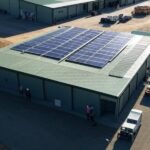Emerging Markets Lead Global Shift In Clean Tech & Climate Investment: Report

Emerging economies in Asia and Africa are redefining the clean energy landscape with local innovations, cost-efficient solutions, and inclusive growth, challenging the West’s traditional dominance
Emerging markets across South Asia, Africa and Southeast Asia are rapidly becoming the driving force of the global clean energy transition, reshaping investment flows and technology development once concentrated in the West, according to The Transition Ledger 2026 report.
Countries like India, Indonesia, Kenya and Nigeria are leading the shift with localised, cost-efficient and scalable clean technology models that combine innovation with economic inclusion.
In India, renewable energy capacity has now surpassed 190 GW, driven by rapid expansion in distributed solar and battery storage systems. The government’s Production Linked Incentive (PLI) scheme for green hydrogen and advanced cell manufacturing has attracted billions in private investment, positioning the country as a major supplier in the global clean energy supply chain.
Indonesia is leveraging its vast nickel reserves, critical for electric vehicle (EV) batteries, to emerge as a key player in the EV ecosystem. Export restrictions on raw minerals have encouraged domestic refining, while local manufacturers are developing affordable electric two-wheelers and battery-swapping networks tailored to regional transport patterns.
In Africa, Kenya and Nigeria are demonstrating the economic potential of decentralised clean energy. Kenya now generates over 90 per cent of its electricity from renewables and has scaled pay-as-you-go solar models integrating mobile payments and real-time monitoring. Nigerian start-ups, including Arnergy and Lumos, are expanding modular solar systems for homes and small businesses, reducing dependence on diesel and creating new credit markets.
Southward Shift Redefines Climate Investment
Analysts say these developments mark a fundamental shift in global energy dynamics. Falling clean tech costs and rapid innovation are allowing emerging markets to develop solutions tailored to their specific needs rather than adopting Western templates.
The trend also signals growing geopolitical and financial implications, with capital flows from investors and development banks increasingly directed towards the Global South. Experts say this shift will determine the speed and inclusivity of the world’s climate transition over the next decade.
As per report, “the world’s climate future is being built from the ground up”, driven by emerging economies turning climate challenges into opportunities for growth, investment and resilience.






































































































































































































































































































































































































































































































































































































































































































































































































































































































































































































































































































































































































